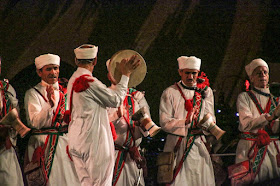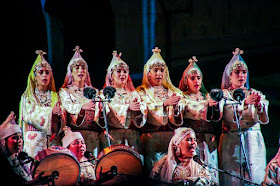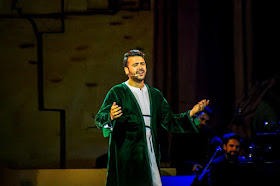OPENING CREATION - FES, MEMORY OF THE FUTURE
Review |
| Venetia Menzies |
Accompanied with hushed tones and gasps from the audience, the entertainment started when Princess Lalla Hasna arrived and sat opposite the stage atop a golden throne. Sister of the current monarch King Mohamed VI, she is an avid fan of social and cultural events, and is known for her work regarding environmental issues in Morocco.
The music began with eery siren-like sounds, introducing an atmosphere of unease and danger. Behind the orchestra, projections of the Fes medina upon a starry night lit up the fortress. The first to grace to stage was a young boy holding a Qur'an, a representation of the city's founder Idriss II, who, according to legend, became an imam at the tender age of 11. The story of the city's foundation was told by a narrator standing atop the walls of Bab Makina, who spoke with an almost comically animated and husky voice. The narration was a welcome addition to this year’s concert, leading the audience through the history of Sufi music, however it was only provided in French.
 |
| The narrator atop the walls |
In honour of the city's musical heritage, the concert opened with the forty-strong Ensemble Taskiwin who chanted and played traditional music whilst stepping back and forward in synchronised form. Opening with this Amazigh group recognised the indigenous peoples of the city, and the first cultural foundations that they lay. As the rhythm climaxed, scream-like interjections from the lead singer enlivened the performers until they jumped up and down on the spot. Masters of dance as well as music, the ensemble invigorated the audience after a rather lengthy wait.
 |
| Ensemble Taskiwin |
Projections throughout the concert included architecture from Fes, Senegal, the holy city of Jerusalem, and the land of Córdoba. These mapped the journey of Sufi Music, which was transferred across regions by practitioners following the spirit of ziyarat, meaning 'a quest for purity, virtue and holiness'. The multinational history of Sufi Music was evident on tonight's stage, peppered with artists from all corners of the ummah, the global Islamic world. Flavours of Persia, Morocco, Algeria, Tunisia, and Palestine were all infused in tonight's performance.
The important contributions of women in the history of this ancient city was next to take centre stage. Projections of the famous Quaraouine madrassa, known globally as the world's first university, were displayed as the narrator told the history of Maryam and Fatima al Fihri Al-Qarawi. According to tradition, these two sisters are the original founders of the University, purchasing the land with their inheritance and laying the first foundations in 859.
This nod to the power and ingenuity of Moroccan women was complemented by an enlivening performance by the Women's Ensemble of Chefchaouen, led by the vocals of Tunisian singer Aida Niati, who performed a moving ballad in traditional dress, completed with a modernised and feminine tarbouche. From the mountain regions north of Fes, known to most as the Blue City, the Women’s Ensemble of Chefchaouen roared and rocked from side to side, exuding confidence in their femininity. Their rhythm and pace intensified exponentially, until the audience sat in trance, unable to identify where each verse began or ended.
 |
| The Women's Ensemble of Chefchaouen |
Moving across from Fes to Algeria, the narrator provided a biography of Ahmed Tijani, founder of the Tijaniyyah Sufi order. After having a spiritual revolution in Fes, he travelled across the Islamic world on his pilgrimage to Mecca, stopping in Senegal, the next stop on our musical journey. Many Sufis originally from Fes joined Sufi brotherhoods in this region, infusing traditions and introducing new instruments and sounds to the practise. Opening with recitation from the Qur'an, the all-female ensemble Mouhsinaatoul Moubaarak, veiled all in white, chanted accapella with such power that their microphones were almost redundant. Behind them was the sand-castle like city of their home Dakar.
Despite their appreciation for this injection of Senegalese energy, for the locals of Fes, there was only one man on stage: the infamous Marouane Hajji. Born in 1987 and raised in Fes, he is something of a local popstar. A violinist and Sufi singer, he rose to fame after winning the 'National Singers of Fes' competition in 1998. Since then he has gone from strength to strength, known for his original, authentic and powerful performances, but even more so for his ability to charm an audience with his charisma and humility.
 |
| Marouane Hajji. |
Tonight he graced the stage in a long velvet green kaftan and sang an ode to the cultural heritage of Fes. Sliding between notes with an inhuman ease, he entranced the audience, who pulled out their phones en masse to capture a snippet of his fleeting performance.
Hajji is a tough act to follow, but the crowd was not disappointed as Moroccan singer Walid Ben Selim, known globally as N3rdistan, departed from his usual techno-influenced take on Sufi Music for an acoustic performance that offered the most unique and moving vocals of the night. He was accompanied on stage by a beautiful woman, excluded from the programme, who plucked a piano-sized string instrument as he crooned.
In a surprise performance that was also missed out of the programme, Moroccan singer Asma Lamnawar graced the stage bejewelled and glittering in a dress as velvety as her tones. The local crowd was delighted by her sudden arrival, overwhelmed by the presence of so many talented Moroccan artists all in quick succession.
 |
| Moroccan singer Asma Lamnawar |
Taking us lastly to holy city of Jerusalem, the Sufi Ensemble of Jerusalem emerged in front of a detailed projection of Al Quds Mosque, the third holiest site in Islam. In what was a rather stiff performance, the men performed in front of candles without moving. An abrupt silence followed their departure, in which each artist took turns to pay their respect to the Princess before the finale. The crowd ululated and screamed as she left the venue shrouded by her security guards.
Despite the programme listing another five additional artists, the audience quickly flooded down the red carpet in an attempt to catch another glimpse of the Princess. A robed ensemble was left on the stage looking rather confused. It was not clear if the concert intentionally finished at this point or if the performers read the room and decided to stop there.
The audience seemed equally confused, an Australian attendee noting that, despite her enjoyment of the concert the finale left her disappointed. Surprises and confusion are a staple of the Fes Festival, and I’m sure that there are many more to come this week as the busy programme commences tomorrow with the afternoon concert ‘Anuna, Sacred Songs of Ireland’ in Jardin Jnan Sbil.
Review and photographs: Venetia Menzies
Credits
Alain Weber: conception and staging
Ramzi Aburedwan: conducting, compositions and arrangements
Christophe Olivier assisted by Gaël Boucault: lighting creation
Mapping: Spectacular - Image Lighters (Franck Marty: artistic director)
Drawings: Judith Gueyfier
Scenography: Sylvain Praud
Technical direction: Hamid Anbassi
Sound direction: Chris Ekers Sounds and Erik Loots
Artistic coordination and general management: Anne Le Gouguec
Cast
Hassan El Jaï: comedian (Morocco)
Taskiwin ensemble: ahwach (Morocco)
Aïda Niati: singer (Tunisia)
Rhoum EL BAKKALI ensemble Hadra Chefchaounia: singers (Morocco)
Mouhsinaatoul Moubaarak: singer (Senegal)
Marouane Hajji: singer (Morocco)
Soufi ensemble Jerusalem: singers (Palestine)
Walid Ben Selim: singer (Morocco) and Jiang Nan: guzhang and singer(China)
Sahar Mohammadi: singer (Iran)
Haig Sarikouyoumdjian and Georgi Minasyan: duduk (Armenia)
Areej Sufi Ensemble: singing and percussion (Sultanate of Oman)
Bahariyya: singing, tar, kamancha, nagara, balaban (Azerbaijan)
Haroun Teboul: nay (Morocco)
Istanbul Mevlevis Dervishes: dance (Turkey)
Brotherhood of Hamadcha, Aïssassa, Ahl Touat and Darqaoua of Fez (Morocco)
Historical advisers:
Frederic Calmès (musicologist), Francesco Chiabotti (Lecturer in Islamology - INALCO Paris), Lahsen Hira (Lecturer Mohammad V University), Fouad Morri El Jaï (engineer specialised in hydraulic clocks)
Artistic advisers: Amina Bensoudah, Soudabeh Kia, Sandrine Le Coz.
Thanks to Priyanka Singh and Tahar Ben Jelloun
Tomorrow at the festival
ANUNA – SACRED IRISH SONGS - 16:30 JARDIN JNAN SBIL
SAMI YUSUF 21:00 BAB AL MAKINA
Temperature should be around 29 Celsius and sunny.
SHARE THIS!




No comments:
Post a Comment